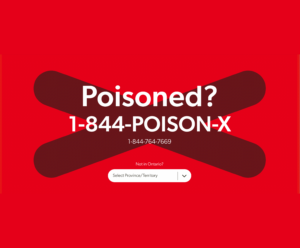
Celebrating a toll-free poison centre number, a decade in the making
This page was last reviewed on March 27, 2023
By Pamela Fuselli and Dr. Kathy Belton
There are not many days that stand out when injury prevention racks up a monumental success. March 20, 2023 was one of those days, when Health Canada announced 1-844-POISON-X.
Now, a toll-free number may not seem all that impressive to you but, for those many people who have worked for more than a decade to get this in place, it is a day to celebrate.
Wind the clock back about 12 years ago. At that time, we each led non-profit organizations, Safe Kids Canada (one of Parachute’s legacy organizations) and the Alberta Centre for Injury Control & Research, and we recognized the hidden and significant magnitude of poisoning in Canada: in particular, with children. Poisoning is overlooked as an issue as it gets little media or policy attention but it’s a much larger public health issue than is generally recognized: In 2018, the last year for which comprehensive national Canadian data are available, poisoning was the third-leading cause of death by injury.
A decade ago, there was no comprehensive poison prevention and control system in Canada. We wanted to understand the current environment for poison prevention in Canada and to recommend where actions needed to be taken. We secured a small Canadian Institutes for Health Research (CIHR) Planning and Dissemination grant and in-kind contributions from the Public Health Agency of Canada. On April 5, 2011, we convened, for the first time, a group of experts from injury prevention, the regional poison centres and government in Ottawa to share and discuss issues related to poisonings and poison prevention in Canada. This was the beginning of collaborations that continue to today.
From this meeting, we co-authored the White Paper on the Prevention of Poisoning of Children in Canada,published October 2011. The white paper provided background about the poisoning problem in Canada, and identified the key concepts, theories, sources of evidence and gaps in knowledge relating to poisoning in Canada. We focused on children as they are a population vulnerable to poisoning and have historically been the target for poisoning prevention interventions. In this paper, there were five recommendations and in recommendation No. 4 we identified two system-level needs that have now been realized.
The first was a national surveillance system for poisoning. Champions within Health Canada and the Public Health Agency of Canada led this initiative. In collaboration with the five regional poison centres, the Canadian Association for Poison Centres and Clinical Toxicology, and Parachute, within a decade, the Canadian Surveillance System for Poison Information (CSSPI) was in place.
On March 20, 2023, the second became a reality: a toll-free line in Canada that the public can use to access their local Poison Centre. This means that callers in most provinces and territories (except for Nunavut and Quebec), don’t need to know their unique regional poison centre phone number but can use the toll-free 1-844-POISON-X wherever they are in Canada.
After the white paper was published, a cross-sector collaboration through the First Receiver CBRNE/HazMat Preparedness Workshop with more than 60 experts from across Canada, led by the Public Health Agency of Canada, resulted in a report published in January 2014, in which a toll-free line was cited as one of the highest priorities.
Fast forward to 2020 when the follow up to the original white paper, Evidence Summary on the Prevention of Poisoning in Canada, was published by Parachute and the Injury Prevention Centre (formerly the Alberta Centre for Injury Control and Research) working with many of the same people who contributed to the first white paper. This document provided an updated picture of poisoning in Canada that recognized the steps forward with the surveillance system but noted the absence of a toll-free line.
The achievement of two significant, system-focused services over a decade of dedicated collaboration demonstrates the true strength of commitment that everyone involved with these efforts brought to the table. We are proud to have been part of it.
Pamela Fuselli is Parachute’s President and CEO. Dr. Kathy Belton is Director at Injury Prevention Centre, School of Public Health, University of Alberta.